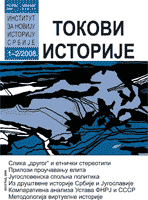MAO CEDUNG, INTELEKTUALCI I POTRESI U KOMUNISTIČKOM SVETU 1956–1957
Mao Zedong, Intellectuals and the Turmoil inside the Communist World 1956–1957
Author(s): Jovan ČavoškiSubject(s): History
Published by: Institut za noviju istoriju Srbije
Keywords: Mao Zedong; Intellectuals; PR China; destalinization; Eastern Europe; SSSR
Summary/Abstract: The main goal of this article is to present the correlation between the external and internal policies of China, especially demonstrated on the concrete case of the status of intellectuals inside the party politics. Even though during 1955 and 1956 Mao Zedong and the CCP leadership had different plans for China and its intellectuals, mostly based on economic necessities of the Chinese society, political turmoil inside the Soviet bloc largely shaped everything that was going on inside the PRC, shifting priorities from internal to external policy issues. Two major factors that had overwhelming impact on the CCP and Mao Zedong him self were the initiation of the process of destalinization in the USSR after CPSU XX Congress, and the turmoil in Poland and especially Hungary that broke out in the aftermath of these seminal events in Moscow. Launching as a response two major campaigns, fi rst the „Hundred Flowers Campaign“ and then the „Anti-rightist Campaign“, Mao Zedong sought to regain shaken positions inside the party and state leadership, while fi ghting all real and potential adversaries. Chinese intellectuals were caught between the hammer and the anvil of internal party strife and global turmoil inside the socialist bloc that fundamentally affected Chinese domestic policies.
Journal: ТОКОВИ ИСТОРИЈЕ
- Issue Year: 2008
- Issue No: 1-2
- Page Range: 113-136
- Page Count: 24
- Language: Serbian

